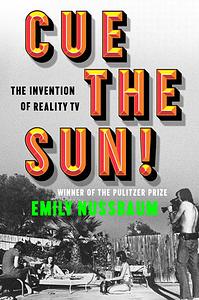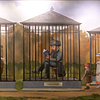Take a photo of a barcode or cover
Deep look at reality tv from the beginning -- before tv! Before Candid Camera, there was Candid Microphone, and other radio shows that had callers telling their stories trying to win prizes. Nussbaum takes a deep look at the various stages of reality tv over the decades. The last quarter or so felt really jumpy because she'd share all the ins and outs of one show over years then go back in time to start telling about another series. There was a lot of focus on the contestants and crews and producers and not much on the audience perspective. As I started to get tired of all these details, she moved on to the Apprentice and the previous detail allowed her to get this level of commentary on Trump without seeming like he was the only bad guy in television.
informative
reflective
informative
medium-paced
adventurous
funny
informative
fast-paced
slow-paced
Honestly this is a very good and engaging history of reality TV for anyone who is really new to the idea of taking it seriously as a genre with a history and impact on culture, but I'm not really sure that it added anything new to the conversation? I'm certainly not an ~expert~ on reality TV academia, and it's not like I didn't finish it! But I also don't think I really learned anything new here that I hadn't already picked up from podcasts and other books I've read in the past.
informative
fast-paced
I'd thought, at first, that I'd find nothing interesting in this book because I don't really watch reality TV, then I was like "well ANYTHING can be interesting if written about well and reality TV is kind of inherently interesting" and so I reserved it from the library.
Second conjecture was correct- this was fascinating. I'd seen basically none of the shows mentioned in the book at basically any point but it didn't matter- as someone fascinated by the history of TV broadcasting I thought that the opening chapters were actually possibly my favorites (and only augmented by my parents, when I mentioned it to them, breaking into the theme song of Candid Camera). The later chapters about specific later reality shows and genres were also incredibly interesting, but more as sources of interesting anecdotes, which they definitely were. (I will note that I skipped the Apprentice chapter because I kept feeling like I already read stuff about that and had zero desire to continue. It also bugged me that it was placed at the end due to the Trump presidency factor despite chronological order seeming to place it several chapters earlier.)
If there's one criticism I had, it's that it made it hard to know what the book thought of as reality TV and what it didn't. My parents kept asking "so did they count game shows" and in the old-TV section, in a sense yes they did- Queen For A Day, The Newlywed Game, and The Dating Game were fundamentally game shows, they were just personality based rather than trivia based, but then they weren't really contextualized with the general game show trends of the era. And there was a whole chapter on Bravo shows that included Queer Eye but then completely left off, say, HGTV despite it being a full channel of that kind of show as well. It's not what people think of when they think "reality TV" while Bravo is, but I couldn't quite figure out why. The Food Network didn't get a mention as such either, but some of its shows were mentioned based on shared production figures/reality-style formats. In general, it was just quite confusing what "counted" as reality TV and what didn't. I would have also appreciated a bit of commentary about reality TV in the age of streaming, with shows like Queer Eye and The Kardashians moving fully to streaming and such. The thread from early TV to modern reality TV was compellingly laid out, but I couldn't completely tell where the lines were drawn.
But while I'm not sure if I can now say that I "understand reality TV"- especially as, again, someone who's seen so little of it- but I absolutely got a great peek into the history of the development of television and a lot of great anecdotes engagingly written, which was basically what I wanted for my afternoon.
Second conjecture was correct- this was fascinating. I'd seen basically none of the shows mentioned in the book at basically any point but it didn't matter- as someone fascinated by the history of TV broadcasting I thought that the opening chapters were actually possibly my favorites (and only augmented by my parents, when I mentioned it to them, breaking into the theme song of Candid Camera). The later chapters about specific later reality shows and genres were also incredibly interesting, but more as sources of interesting anecdotes, which they definitely were. (I will note that I skipped the Apprentice chapter because I kept feeling like I already read stuff about that and had zero desire to continue. It also bugged me that it was placed at the end due to the Trump presidency factor despite chronological order seeming to place it several chapters earlier.)
If there's one criticism I had, it's that it made it hard to know what the book thought of as reality TV and what it didn't. My parents kept asking "so did they count game shows" and in the old-TV section, in a sense yes they did- Queen For A Day, The Newlywed Game, and The Dating Game were fundamentally game shows, they were just personality based rather than trivia based, but then they weren't really contextualized with the general game show trends of the era. And there was a whole chapter on Bravo shows that included Queer Eye but then completely left off, say, HGTV despite it being a full channel of that kind of show as well. It's not what people think of when they think "reality TV" while Bravo is, but I couldn't quite figure out why. The Food Network didn't get a mention as such either, but some of its shows were mentioned based on shared production figures/reality-style formats. In general, it was just quite confusing what "counted" as reality TV and what didn't. I would have also appreciated a bit of commentary about reality TV in the age of streaming, with shows like Queer Eye and The Kardashians moving fully to streaming and such. The thread from early TV to modern reality TV was compellingly laid out, but I couldn't completely tell where the lines were drawn.
But while I'm not sure if I can now say that I "understand reality TV"- especially as, again, someone who's seen so little of it- but I absolutely got a great peek into the history of the development of television and a lot of great anecdotes engagingly written, which was basically what I wanted for my afternoon.
informative
lighthearted
slow-paced
dark
informative
fast-paced
I loved the chronological exploration of the reality genre, going back to radio with candid microphone and callers on talk shows. Nussbaum looks at the psychological implications on the “contestants” and the sociological implications on American life. She details how reality was skewed through this lens and how things that would have shocked us at this genres inception are now the goal of many producers.




